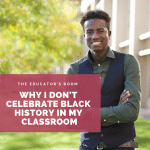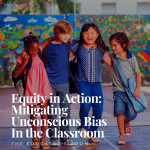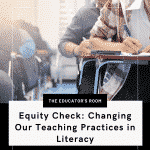Believe it or not, we are living during an educational renaissance. Politicians are grappling with how much money should be dedicated to school systems to adequately pay teachers and provide proper resources, principals must consider the metrics to use to observe teachers as virtual academies crop up throughout the states, all while teachers navigate mitigating Covid in classrooms and engaging students who have not socialized freely since 2019.
Times are rough but exciting, to say the least.
Due to the pandemic, we were forced to reconsider the norms of education. To add to the myriad of concerns raised in schools and beyond, protestors are calling on school boards and politicians to ban Critical Race Theory (CRT). There are a plethora of definitions for CRT, but most can agree that it asserts that race is a social construct and that laws and systems in the U.S support the uplifting of a majority while creating barriers and shackles for others.
Critical Race Theorists are particularly concerned with school curriculum perpetuating false narratives that present one group of people as heroic, worthy, or gifted while presenting other people as absent in history, irrelevant, weak, or cursed, in some instances. While CRT protesters may think that teachers plan to teach lessons using white guilt as a common theme, those in favor of critical race theory want to teach facts that push us forward as a nation.
When analyzing the truths of America’s origin story, it is easy to see that the facts are not aligned with the content of school books and classroom discussions. Ironically, Christopher Columbus is still celebrated as a hero for mistakenly landing in the free world while looking for India. While he did achieve an amazing feat by crossing perilous shores, I wonder whether his mark on history is positive enough to warrant a holiday and chapters in history books.
Even though he missed India by some 8,000 miles, he settled on calling the indigenous people “Indians,” a mistake still perpetuated by sports teams, westerns, and Thanksgiving-related paraphernalia. What harm would there be in telling students the truth? Well to begin, the truth presents Mr. Columbus as foolish and audacious. Students may begin to wonder, who was truly barbaric: the indigenous people or the Europeans who destroyed their culture and plunder their land? The closer you are to the facts, the murkier the image becomes.
But Critical Race Theory is not about Christopher Columbus or the wrongs of the past; it’s about teaching the truth, despite who feels guilty or sad so that we can right the wrongs of the past, today.
When kids don’t learn the factual narrative of America in History or read authors that challenge the American Dream ideology, students are robbed of true learning opportunities. The goal of education should be to create critical thinkers, not to indoctrinate students with biased history and homogeneous literature. But that’s the thing, it seems that the power structure may be more concerned with perpetuating the heroic American narrative rather than acknowledge the horrors of the past.
In Trevor Noah’s autobiography, Born A Crime, he states that South Africa and America are very similar given their historical racial tensions. The difference, however, is that South Africa acknowledged the wrongs of the past by offering people of color reparations.
We know that reparations could never pay people back for systemic oppression; that is not the stuff of reparations. Reparations do, however, say that we did something despicable and we are genuinely sorry for these egregious acts. Reparations are the political way to undo systems of oppression and admit that as a nation, we must do better.
I speak of South Africa to demonstrate how much work we have to do as a nation. How can we move forward if we cannot reconcile the past? Our kids need Critical Race Theory in classrooms if there is ever hope to build a more cohesive, honest, and loving country.







